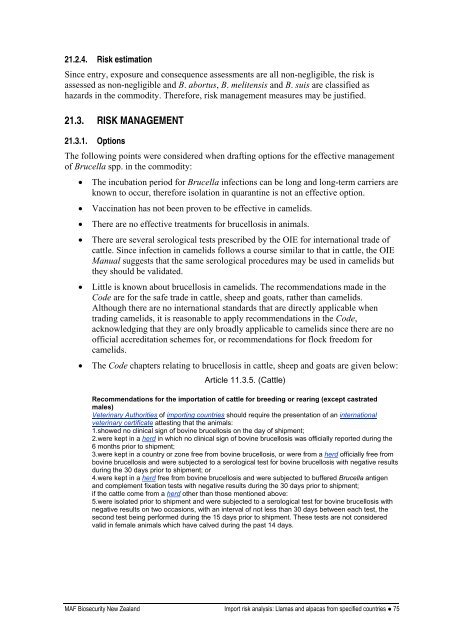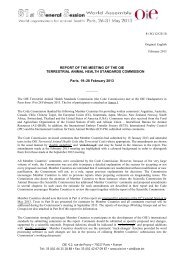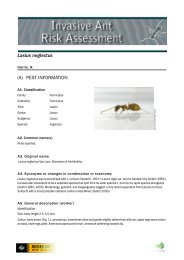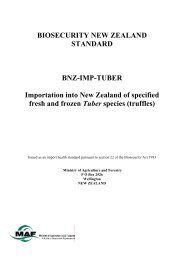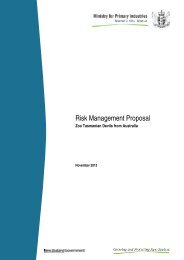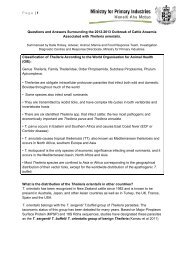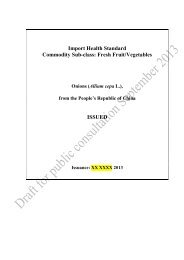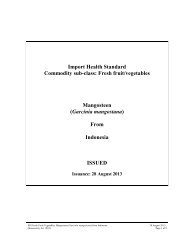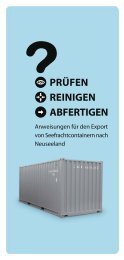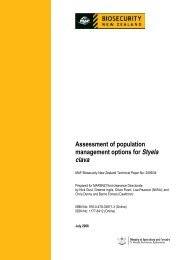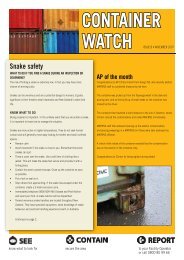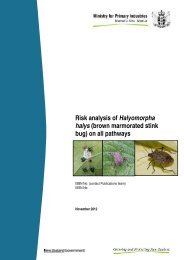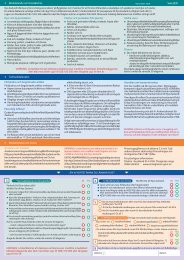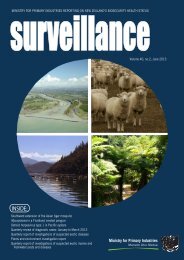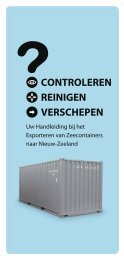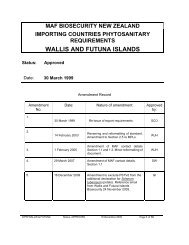Import risk analysis: Llamas (Lama glama) and alpacas (Vicugna ...
Import risk analysis: Llamas (Lama glama) and alpacas (Vicugna ...
Import risk analysis: Llamas (Lama glama) and alpacas (Vicugna ...
You also want an ePaper? Increase the reach of your titles
YUMPU automatically turns print PDFs into web optimized ePapers that Google loves.
21.2.4. Risk estimation<br />
Since entry, exposure <strong>and</strong> consequence assessments are all non-negligible, the <strong>risk</strong> is<br />
assessed as non-negligible <strong>and</strong> B. abortus, B. melitensis <strong>and</strong> B. suis are classified as<br />
hazards in the commodity. Therefore, <strong>risk</strong> management measures may be justified.<br />
21.3. RISK MANAGEMENT<br />
21.3.1. Options<br />
The following points were considered when drafting options for the effective management<br />
of Brucella spp. in the commodity:<br />
� The incubation period for Brucella infections can be long <strong>and</strong> long-term carriers are<br />
known to occur, therefore isolation in quarantine is not an effective option.<br />
� Vaccination has not been proven to be effective in camelids.<br />
� There are no effective treatments for brucellosis in animals.<br />
� There are several serological tests prescribed by the OIE for international trade of<br />
cattle. Since infection in camelids follows a course similar to that in cattle, the OIE<br />
Manual suggests that the same serological procedures may be used in camelids but<br />
they should be validated.<br />
� Little is known about brucellosis in camelids. The recommendations made in the<br />
Code are for the safe trade in cattle, sheep <strong>and</strong> goats, rather than camelids.<br />
Although there are no international st<strong>and</strong>ards that are directly applicable when<br />
trading camelids, it is reasonable to apply recommendations in the Code,<br />
acknowledging that they are only broadly applicable to camelids since there are no<br />
official accreditation schemes for, or recommendations for flock freedom for<br />
camelids.<br />
� The Code chapters relating to brucellosis in cattle, sheep <strong>and</strong> goats are given below:<br />
Article 11.3.5. (Cattle)<br />
Recommendations for the importation of cattle for breeding or rearing (except castrated<br />
males)<br />
Veterinary Authorities of importing countries should require the presentation of an international<br />
veterinary certificate attesting that the animals:<br />
1.showed no clinical sign of bovine brucellosis on the day of shipment;<br />
2.were kept in a herd in which no clinical sign of bovine brucellosis was officially reported during the<br />
6 months prior to shipment;<br />
3.were kept in a country or zone free from bovine brucellosis, or were from a herd officially free from<br />
bovine brucellosis <strong>and</strong> were subjected to a serological test for bovine brucellosis with negative results<br />
during the 30 days prior to shipment; or<br />
4.were kept in a herd free from bovine brucellosis <strong>and</strong> were subjected to buffered Brucella antigen<br />
<strong>and</strong> complement fixation tests with negative results during the 30 days prior to shipment;<br />
if the cattle come from a herd other than those mentioned above:<br />
5.were isolated prior to shipment <strong>and</strong> were subjected to a serological test for bovine brucellosis with<br />
negative results on two occasions, with an interval of not less than 30 days between each test, the<br />
second test being performed during the 15 days prior to shipment. These tests are not considered<br />
valid in female animals which have calved during the past 14 days.<br />
MAF Biosecurity New Zeal<strong>and</strong> <strong>Import</strong> <strong>risk</strong> <strong>analysis</strong>: <strong>Llamas</strong> <strong>and</strong> <strong>alpacas</strong> from specified countries ● 75


